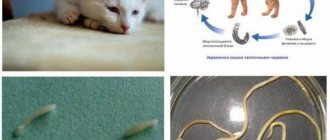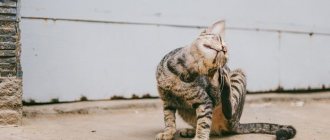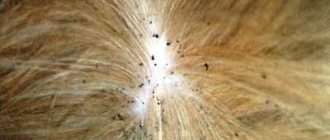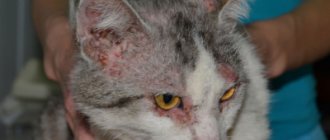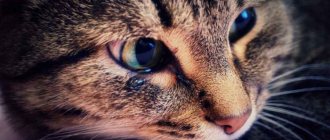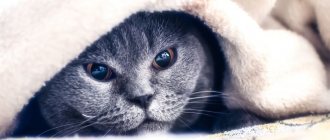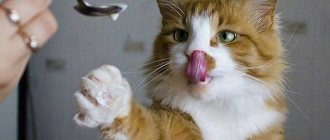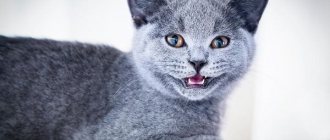You may find your cat licking her paws or "chewing" herself from time to time. Why do cats take care of their hygiene? Grooming is a calling card for most cats and begins immediately after birth. Mothers lick their kittens to clean them, encourage them to urinate, and encourage them to suckle to provide comfort and strengthen the bond. At four weeks, kittens begin to groom themselves and soon after their mother and siblings. This grooming of themselves and others (called allogrooming) continues into adulthood.
Reasons for this behavior
In cats, constant licking of the genitals can be caused by inflammation of the prepurcial sac - the so-called skin fold of the foreskin that forms the space between the head of the penis and the skin. The folds of skin contain preputial lubricant that surrounds the cat's penis.
In a healthy animal, a small amount of liquid in the form of whitish-yellow smegma, the secretion of the glands of the foreskin, may occasionally accumulate along the entire perimeter of the preputial opening. Such discharge is considered normal by veterinarians. If for some reason an inflammatory process begins in the area of the foreskin, then this fluid includes inclusions of blood, pus or urine.
The reasons why a cat licks its tail may be as follows:
Disease of the foreskin, including the occurrence of neoplasms (cancer) in this area, mechanical damage, balanoposthitis (inflammation of the foreskin). Diseases of the urethra: trauma, the formation of stones and their subsequent passage, neoplasia. Bladder diseases: stones, infectious inflammation, neoplasms, Pathology of the prostate gland, prostatitis, cysts, hyperplasia, neoplasms, abscess. Coagulopathy (bleeding) and thrombocytopenia that occurs in parallel with it (a decrease in the level of platelets in the blood) - such an ailment can be a consequence of poisoning with rat poison. Urinary incontinence - occurs due to displacement of the ureter, or improper functioning of the sphincter, which is responsible for the amount of urine released. The cat simply performs part of his daily toilet routine by thoroughly licking his genitals after going to the toilet. An animal can lick a wound under its tail
Surely every person has heard the point of view that a cat always heals itself by licking sore spots. A cat may lick under its tail due to the fact that it suffers from constipation; the painful sensations create constant torment for it, from which the pet tries to get rid of it in all available ways. Itching in the anus can also cause excessive licking under the tail; in this case, the owner should pay attention to the cat’s feces, if it contains traces of helminthic infestations, this particular cause must be gotten rid of. A cat may start licking its tail as a result of being in a stressful situation: moving to a new place of residence, castration, remodeling a house, having new family members or pets - absolutely all innovations can cause a cat to panic and plunge it into a depressive state.
Why do cats lick themselves?
The reasons why these animals lick themselves all the time are not always as harmless as they seem. Sometimes such licking indicates illness
To understand that it is time to sound the alarm, the owner of such a pet should know why the cat licks itself all the time, paying special attention to certain areas of the body, for example, the area near the anus or nose
Hygiene, grooming
After contact with other animals and people, cats tidy up their fur. During the washing process, the pet is relaxed and completely focused on the cleanliness of its coat.
When washing, he does not focus on one part of the body, paying equal attention to the tail, paws and muzzle. Usually, after the procedure is completed, the animal quietly dozes
Self-soothing, stress relief
Cats are very vulnerable animals. Any event, be it a change of residence, a trip to the veterinary clinic, family quarrels, the arrival of a new pet in the house or rough treatment, can cause stress in them. Some cats, experiencing strong emotional stress, begin to actively lick their lips. Why do they do this and how does it relate to negative emotions?
Some people, when worried or nervous, bite their nails or bite their lips. Cats lick themselves. So both of them try to protect themselves from an unpleasant situation, transferring the reaction from an inaccessible object or action that they cannot influence to an accessible one.
Trying to get rid of skin parasites
If your pet constantly licks itself and shakes its head, creating the feeling that it is gnawing something out of its fur, most likely it is tormented by skin parasites: fleas, lice eaters, ticks. An animal infected with ectoparasites becomes restless and lethargic, sleeps and eats poorly, and the condition of its coat deteriorates. It is wrong to think that outdoor pests can only affect stray cats or those who are often outdoors. Any pet, no matter how well-groomed it may be, can pick up fleas or ticks simply by rubbing against the owner’s leg after returning from a walk.
Skin itching due to allergies, fungal infections, metabolic disorders
Your pet may constantly lick itself to relieve itchy skin, which is caused by:
- allergic reaction to food, dust, pollen of flowering plants, medications, etc.;
- skin lesions due to fungal infection;
- metabolic disorders.
Allergies do not pose a danger to a cat if treatment is started in a timely manner. Usually it is enough to exclude your pet from contact with the allergen, and the symptoms of an allergic reaction will disappear. A fungal infection can be easily recognized by a number of signs:
- baldness of certain parts of the cat’s body;
- bloody sores covered with scabs;
- dryness, peeling, redness or, on the contrary, pallor of the affected skin.
Itching in the anus due to worms
If your pet is licking under its tail, this may indicate that it has worms. Some types of helminths cause itching in the anus, causing the animal to become restless, sleep poorly and eat poorly. The cat owner needs to examine the contents of the cat's litter box. When a pet is infected with helminthiasis, parasites can be found in its feces. Ignoring the symptoms of this disease can have serious consequences for your cat's health.
Inflammation of the paraanal glands
Why does an animal lick its anus, ride its butt and chew its tail? This behavior may be caused by inflammation of the paraanal glands, which are located on both sides of the anus and serve to produce a special odorous substance necessary for contact with fellow animals. Sometimes these glands become clogged and inflamed, causing significant discomfort to their owner. This usually occurs due to frequent constipation and decreased muscle tone.
Animals over 4 years of age are most susceptible to this disease. The inflammatory process cannot be ignored, as it can lead to blood poisoning, and in especially severe cases, to the death of the cat.
Cats in heat
If your pet has a clear, odorless discharge, she raises her pelvis, throws her tail to the side and actively licks her genitals, it means she is in heat. During the estrous cycle, a cat may compulsively display its genitals to members of the household.
If her behavior is ignored, she turns her attention to inanimate objects: scratching post, corners, doorways
What to do if a cat spanks with its lips.
If you notice that your cat has started smacking its lips, the first step is to determine whether it is caused by a medical problem. To understand this, you need to do the following:
Assess the cat's behavior. Is she nervous? Perhaps worried or scared? Try to determine if the cat is trying to communicate anxiety by slapping its lips. If you think that the situation may cause discomfort in the cat, this may be a manifestation of repressive behavior
You can help your cat by eliminating the cause of stress and improving the environment.
It is important to understand whether lip smacking is caused by a medical problem. It's best to consult a veterinarian
Try to track when the cat spanks with its lips. Does she do this all the time or, for example, after eating? Or in moments of anxiety or worry? This information will help your veterinarian figure out the cause. Doctors also check the condition of the skin on the face and lips, gums, teeth and oral cavity. They look to see if there are any foreign objects in the mouth, if the cat is suffering from dental diseases, or if there are ulcers in the mouth. The doctor may need information about the cat's diet, changes in its usual diet, possible poisoning, appetite, vomiting, diarrhea, activity and weight loss.
With this they read:
Sterilization of cats
Sterilization of cats is a manipulation necessary for all cats that have reached sexual maturity (at least 7 months), whose owners do not plan to breed them
Kitten in the house
If you decide to get a kitten, you need to know how to care for your pet.
Heart failure in cats
Heart failure is a condition in which the heart is unable to provide sufficient blood flow. As a result, organs and tissues suffer from oxygen starvation and nutritional deficiency.
Vaccination of cats and kittens
The majority of cat owners keep their pets exclusively at home, avoiding contact with other animals, as well as walking outside or going to the country, and therefore believe that their animal will not be able to pick up infectious diseases anywhere.
Ascites in cats treatment, symptoms and causes
Abdominal dropsy, or ascites, in cats is a secondary disease that is a consequence of renal, liver and heart failure, as well as a number of other quite serious diseases that provoke the accumulation of peritoneal fluid.
My cat drinks a lot, what's wrong with her?
If your cat begins to drink more than usual, pay attention to whether its diet has changed. Animals receiving natural food or wet industrial canned food drink less than those on dry industrial diets.
Physiological causes and symptoms
If your cat walks with its tongue hanging out, you should not be touched, but be wary and look for reasons.
As a rule, a protruding tip of the tongue indicates swelling of the oral cavity, which may be associated with inflammatory processes in the mucous membranes of the mouth or throat.
In some cases, the sign indicates periodontal disease, or toothache. As such processes progress, the root of the cat's tongue swells and literally does not fit into the mouth
.
Tumors
in the oral cavity may make it difficult to close the mouth, the cat will keep its mouth open and its tongue sticking out.
There are more than a dozen ailments that lead to the formation of nodules or ulcers on the gums
of an animal, their spectrum varies from uremia and acute renal failure to viruses. If, when examining your mouth, you find nodules, cracks, bruises, open wounds or other changes in gum tissue, you need to consult a doctor. Not all ailments can be determined without blood tests and a general examination, and improper treatment or self-medication will only harm your pet.
Hot weather can cause you to breathe with your mouth open and your tongue sticking out.
..but there are a few caveats. This condition can be considered normal if the air temperature is really very high, if the cat has nowhere to hide from the heat, or if it had to show forced activity. If a cat constantly sticks out its tongue and is not under stress, this is a symptom of an illness.
The biggest danger is missing the first signs of serious heart failure by being touched by your tongue sticking out. If your cat breathes like a dog, looks exhausted after running, or you observe pallor of your pet’s mucous membranes after exercise, you should consult a doctor. It is worth mentioning that if the four-legged animal has just made a forced march, while escaping from a dog or in pursuit of prey, breathing with an open mouth and protruding tongue can be considered a variant of the norm. Behavior indicates short-term oxygen starvation
experienced during stress.
If a cat often breathes with its mouth open for no apparent reason, it must be shown to a doctor. Perhaps your pet has a disease, the first symptom of which is difficulty breathing, the difficulty is that such a deviation is very popular and can be interpreted in different ways. Here are just some of the pathologies that can be determined independently (at least the probability of detection is high):
swelling of the larynx or tongue.
Chipped tooth or gum inflammation.
Lack of saliva - the mouth will look tight and dry.
- can be determined by wheezing, shortness of breath, cyanosis... but respiratory failure is a very vague diagnosis, which should be clarified by a veterinarian.
Muscle atrophy – can occur due to pinched nerves or injury. It is determined simply - you need to touch your tongue and upper palate with your finger; if the cat does not close its mouth, then it cannot do this.
Trauma, dislocation, subluxation of the jaw - accompanied by swelling, pain, and the inability of the cat to close its mouth. It is worth understanding that subluxation can occur without a blow or external influence, for example, when the articular tissues are destroyed due to metabolic disorders or congenital pathology.
The tongue is a muscular organ located in the oral cavity and performs a variety of functions: from participating in the process of receiving, holding and digesting food to recognizing the taste of food. In addition, for cats, this device is also an excellent assistant in carrying out daily hygiene procedures - you can hardly find a furry pet that has never washed itself in its life, giving it a well-groomed and shiny appearance.
The first thing a veterinarian does during a clinical examination of an animal brought to him is to look into the mouth. And this is not surprising: the condition and appearance of the tongue can be used to judge the health of the animal. A change in color, the appearance of plaque, ulcers, wounds on the mucous membrane indicate the beginning of the pathological process.
But the article does not talk about the structure of this amazing organ; we are interested in the question, for what reasons can a cat stick out its tongue? If we think globally and as closely as possible to science, then there are two factors by which the tongue can extend beyond the boundaries of the oral cavity:
the first is physiological, when there is no reason to worry and such behavior is the norm; the second is pathological, when it is necessary to urgently and immediately pay attention to the health of your furry pet.
Causes of obsessive licking and gnawing of cats
So, have you noticed that your pet has started scratching, licking and even gnawing itself frequently? This is a clear sign that your cat either has parasites or there are other causes of itching and irritation. The cat will not just constantly lick and scratch himself; this is a defensive reaction to the fact that something is bothering him. Let's consider all possible causes and signs.
Fleas
This is perhaps the most common reason that a cat scratches and licks itself all the time, especially in the area above the tail and on the paws. These parasites can even appear in pets, so no one is safe from them. At the same time, if you do not see small black dots on your cat’s fur, this does not mean that there are no fleas. They can still be very tiny (nits) or simply in the form of eggs on the fur. However, their vital activity will already cause enormous inconvenience and discomfort to the pet.
Other parasites
In addition to fleas, your cat may develop other skin parasites that can cause anxiety and discomfort. The pet will also itch and lick itself a lot. A clear sign of the presence of any parasites is if the cat tries to gnaw something out of its fur. The animal intuitively tries to remove annoying enemies in this way. The most common of them are lice and ticks, which in turn are also dangerous because they carry infections and viruses.
Allergy
If you regularly treat your cat's fur for parasites and the veterinarian's analysis does not show their presence, the cause of the itching may be an allergy. Pedigree cats and cats suffer from it especially often. This may be, like in humans, a manifestation of sensitivity to food, furniture upholstery, or some chemical component. A particularly clear sign of an allergy is when a cat licks itself heavily, thus trying to scratch its nose and lips.
Bacteria and fungi
Various microflora live on the skin and in the body of any even healthy animal. But if the cat’s body is weakened, experiencing some kind of stress, lack of vitamins, etc., this can cause an increase in the amount of pathogenic microflora. Because of this, various types of skin inflammation, rashes, itching occur, and the pet’s general condition worsens. Most often, the cause of this phenomenon lies in bacteria and all kinds of fungi. By the way, they can also be transmitted through human hands, because the cat constantly licks itself.
Skin diseases
As a rule, they are all infectious in nature and occur after a pet comes into contact with an infected object. Sometimes it is enough for a cat to go outside just once to pick up some kind of infection. Often, diseases such as pyodermatitis, cheyletiellosis, demodicosis, and scabies occur. They are also caused by mites that parasitize the upper and deep layers of the skin. Severe itching in the first stages very quickly develops into general skin damage and baldness.
Hormonal disorders
Another of the many reasons why your pet is scratching and licking excessively. As a rule, the cat may experience symptoms of all the previously described causes, for example, baldness, itching, urticaria, and so on. But this is not always due to parasites or diseases. This reaction can be caused by endocrine disruptions, which must be correctly determined by a veterinarian. A therapeutic diet and corrective therapy are prescribed.
Treatment
If you notice that your cat is constantly itching, licking itself, and at the same time acting restlessly, hitting its tail, you should immediately take your pet to the veterinarian. It is better not to try to establish the cause and diagnosis yourself, since many of the symptoms are similar to each other. Laboratory analysis and proper examination will be required.
If the reason that the cat is constantly itching, licking and licking itself lies in fleas and other skin and fur parasites, then external treatment is prescribed. The veterinarian may prescribe special drops or sprays, or recommend treating the animal with medicated shampoo. As a rule, using all these drugs several times helps to quickly remove itching and irritation and overcome parasites. In the future, only timely prevention will be required.
If the skin ailment is caused by an infection or fungus, medicinal sprays and drops will also help in the early stages. But, as practice shows, special medications and antibiotics may still be required. If the cat is constantly itching, licking its face, scratching its ears and eyes, antihistamines are prescribed. An accurate analysis is performed and the source of the allergy is determined.
[custom_ads_shortcode3]
Reasons for a cat's excessive attention to itself
Allergy
If your cat is constantly itching or her eyes are running, this could be an allergic reaction to food, food additives, or water. Detergents used to wash the tray or simply used to clean the apartment can also be irritants. Allergies can be caused by special shampoos that are used to care for cat fur. Try to wash your pet as little as possible; the cat constantly cleans itself.
Sometimes cats react to spring flowering, when pollen is everywhere, flies into an open window and fills the entire room with its microparticles.
The cause of an allergic reaction can be bites of mosquitoes, midges and horse flies. As with people, some tolerate the bite normally, while others experience severe redness and swelling.
Fungal disease
Constantly scratching your fur can be caused by ringworm. This disease forms on the skin of an animal, affecting the hair follicles on the body. The skin becomes inflamed and begins to itch. Therefore, the cat begins to actively scratch the affected areas. The disease is contagious to humans.
In addition to lichen, fungal diseases can occur on the cat’s skin. They also cause itching.
Presence of ticks
Often in the summer people take their pets out into nature. The cat is active and runs everywhere. Can climb a tree, climb a fence or onto the roof of a house. Climb into bushes or impassable grass. Having run and played enough, she can bring ticks with her. These insects, having drunk enough, fall off after a while and it seems that everything is fine - there are no mites, and there are no problems. This is wrong. If the tick was infected, it could also infect the cat. The sooner specialists remove the tick and check it for a number of infections, the sooner treatment of the disease will begin, which will cause less harm to the animal.
Some types of ticks use animals as incubators. By making a hole in the animal's skin, they lay their eggs there. And subsequently, offspring should hatch from them. All this provokes severe itching in the animal. Sometimes the scratching is so strong that the cat may bleed.
Pyoderma
This disease causes a strong inflammatory process in the cat’s body, which activates severe itching in the animal.
A streptococcal form of the disease is possible, which develops in the subcutaneous areas of the animal. The infection is contagious and can be transmitted to humans. Under no circumstances should you delay treating your pet, especially if there are children in the house.
Otitis
One of the very common diseases in cats. With ear pain, a cat not only constantly scratches and licks its ears, it becomes lethargic, eats and sleeps poorly. Maybe even cry. Ear pain causes particular discomfort to the animal. With inflammation, the temperature may rise. If left untreated, it can be fatal.
Hormonal disbalance
Yes, cats, like people, have hormonal imbalances. They can also cause skin irritation on the body. In this case, the fur becomes uneven, falls out, and the skin dries out. Sometimes bald islands even form. Excessive peeling of the skin appears.
Lack of vitamins or, conversely, oversaturation
Lack or oversaturation of vitamins A and E leads to disruption of the cat’s entire system. In this case, the skin begins to dry out and become covered with scales. The animal begins to constantly scratch its skin and lick troublesome areas.
Fleas
Small insects that sometimes cannot be seen with the naked eye, but their presence causes severe discomfort to the pet. A cat can get such tenants on the street from its feline friends or from a passing dog. Sometimes you can bring such a friend simply from the street to your apartment. In order to prevent your pet from getting sick, do not forget to put a flea collar on your cat or use a special liquid product that is applied to the withers. It will prevent uninvited guests from moving in.
The cat nervously licks itself
A four-year-old mongrel cat. He eats Cat Chow Urinary (since there are problems with ICD), and we rarely indulge him in boiled chicken entrails or Hills canned food. On August 29, they drove away his fleas with Bars drops, when in early September it was time to worm him, but they were afraid: it seemed that the cat had been replaced. He became all nervous, shaking the skin on his back, itching constantly... Previously, he slept exclusively with me, now more on the windowsill or behind the door. I even have a suspicion that he had sleep disorders. I slept much less than usual. He goes to the toilet according to the usual schedule in the usual volumes, eats maybe a little more than usual, and drinks the same. When examining the skin and fur, nothing suspicious is found except combed scabs. It is not possible to comb himself with a brush, he has become not at all tame (although it used to be a joy to sit in your arms), he only comes to his mother’s arms and purrs, and never takes a step closer to me. As for the fleas returning: it’s unlikely, because the apartment was also washed twice until it was shiny with anti-flea shampoo and Celandine spray, and his favorite balcony was treated with dichlorvos.
In the hope that everything would go away, Malavit was dripped onto his main areas of scratching: above the left eye, on the withers. Then my patience gave out, and on September 11 we went to the clinic. There they prescribed us Suprastin and Gamavit, thinking that it was his reaction to Bars. After Suprastin I began to sleep better and itch less. As we were told, on September 14 we had an appointment again: they took us off Suprastin and told us to replace it with Drotaverine. (I replaced it with Papaverine).
But I’m still confused by his “twitchiness” or something. He doesn’t sit in his arms for a long time, he still sleeps on the windowsill, washing machine or on the shelf allocated for him. He jerks his skin mainly after I hold him in my arms. He plays, but not as passionately as before (that is, you need to spend more time on getting him interested). Otherwise, he is healthy (at least, no more unhealthy manifestations have been identified, at the same time they passed a urine test (quite planned), everything is normal for us) The scabs from scratching disappear.
On Friday it was decided to bathe him with hypoallergenic shampoo. Nothing has changed, he hates me even more.
Already giving up. I can’t find a place for myself.
Prevention
Preventive measures boil down to following the following recommendations:
do not allow your pet to come into contact with stray animals;
use special means for the prevention of parasitic diseases (collars, sprays, drops, etc.);
Regularly comb the animal and monitor the condition of the skin and coat;
feed with good quality food and mixtures from trusted manufacturers;
Visit your veterinarian regularly for a clinical examination.
The owner should know that the pet’s close attention to its coat, constant licking, and combing the skin with its paws is not a harmless phenomenon. As a rule, such anxiety is caused by the development of the disease
Only a veterinarian can identify the cause, make a diagnosis and prescribe treatment for a pet.
- How to determine lichen in a cat, what it is and how... This form of the disease causes anxiety in the animal, burning and itching. ... To do this, you need to regularly monitor the condition of the skin. ... Why is a cat thin, reasons why a cat doesn’t... Read more
- Why does a cat's hair fall out, it comes out in clumps...
Key reasons why a cat's hair falls out. Fluffy and affectionate cats are a real decoration for any home. ... With allergic hair loss, the owner will also experience itching, redness of the skin... Read more - The cat scratched its ear until it bled: what to do if it itches...
Reasons for the animal's behavior. The reasons why a cat scratches its ears... A parasitic mite gnaws through the layers of the epidermis and violates the integrity of the skin. ... The animal has severe itching and restless behavior. Read more - Ringworm in a domestic cat: where could it come from?
The main reasons why lichen in a domestic cat can arise. ... injuries and microtraumas of the skin ... The disease is accompanied by itching. An infected animal often itches and behaves restlessly. Read more - How to treat lichen in a cat, what to smear and treat...
Lichen planus. It causes a malfunction of the immune system and is a non-contagious form. ... The cat is bothered by itching and scratches often. ... Violation of the integrity of the skin leads to the penetration of bacteria and... Read more
Maintaining hygiene
A pet needs some regular care. This is especially true for cats that roam freely on the street. The animals themselves also monitor the cleanliness of their bodies, and carry out all cleaning procedures independently. For this reason, cats constantly lick themselves.
Most often, furry pets take care of themselves after eating, sleeping, or visiting the litter box. The tongue of cats is designed in such a way that it is able to clean off matted fur, food debris, dirt, and dead hairs.
In addition to cleansing, licking helps to distribute sebaceous secretions evenly throughout the body. The fat secreted by the animal's skin is necessary to lubricate the coat, which also contributes to its elasticity.
A clean animal carefully licks its fur, washes its face and ears with its paws, and removes unnecessary hair between its claws with its teeth. If your pet has thick fur, it is recommended to inspect it periodically. Sometimes tangles form in hard-to-reach places. For this reason, you should periodically comb the animal with a special brush, and carefully cut off the tangles.
Licking allows you to lay the fur in the right direction - this is another reason why a cat constantly licks itself. In this way, the animals manage to maintain the required temperature regime.
Prevention measures
- Limit your indoor cat's contact with street animals. At the same time, do not deprive her of fresh air: you can let your pet out onto the balcony or into a fenced-in space, for example, in the country.
- Timely treat your pet against external (fleas, ticks) and internal (helminths) parasites.
- Inspect the animal's fur and skin.
- Provide a balanced diet and avoid consuming foods that cause allergic reactions.
- Cats feel the manifestation of love and care from humans. You should not allow your pet to experience stress. Any worries and neuroses are the first step towards the development of diseases.
- Regular visits to the veterinary clinic.
How to treat?
Constant licking of fur down to the epidermis is not normal and requires therapeutic measures. It is impossible to eliminate the problem without finding out its original source. To do this, contact a veterinarian who will conduct a diagnosis and select medications if necessary. Drug treatment is required for atopic dermatitis. To eliminate itching, the following medications are prescribed for cats:
- "Prednisolone";
- "Dexamethasone."
When a pet licks its fur to the skin under the influence of stress factors, the cat needs to be provided with peace and surrounded with care. If pathological licking occurs against the background of an allergic reaction, then the influence of the irritant on the cat’s body is immediately excluded. If the violation does not go away, then additional antihistamines are prescribed. To combat the problem caused by small parasites, pet hair is treated. For this purpose, you can use antiparasitic drops, tablets or sprays.
Experts' opinion
Despite the fact that an animal with its tongue hanging out looks cute and makes you smile, we must not forget about the possible threat to its health
First of all, you need to pay attention to any changes in your pet’s behavior.
First of all, this sign means complete trust and relaxation. If the animal is in a stuffy place and often sticks out its tongue, then it is worth moving it to a cooler room.
Most importantly, any symptoms that occur along with frequent tongue protrusion can signal that the animal is starting to get sick. Some diseases, such as rabies, can cause aggressive behavior in an animal that is dangerous to humans.
Before you start admiring your pet's new ability, you should show it to the veterinarian. There are many dangerous diseases that can be avoided if you just start treatment on time. The examination will not take much time, and you will be sure that the cat’s peculiarity does not cause harm, and you will continue to admire it.
Veterinarian advice
It is no secret that many parasites and viruses are transmitted from one animal to another, through the hands of people, but you should not be afraid and limit the freedom of a cat. Of course, there is no need to throw your pet into a pack of stray cats, but letting it out for a walk on the balcony or in the country is quite possible. Like any animal, cats also need fresh air and sun. It is enough just to keep the animal clean and carry out timely antiparasitic treatment.
Do not forget about a proper and balanced diet, which is also the key to your pet’s health. If he has a strong immune system, then no infection will be scary to him. Do not feed prohibited foods, sweets, salty and smoked foods.
All this can cause or provoke the occurrence of food allergies. Pay attention to when your pet licks.
And finally, the last piece of advice is love and affection. Remember that your cat is a living creature that needs your care and attention. A change of owner or a change in your behavior can cause stress in your pet. And stress, as you know, is the first step to illness. If you want to pet an animal, but it is nervous and wags its tail, it is better to leave it alone, do not squeeze or pick it up without the desire of the pet itself. Remember that he also has the right to peace and rest.
Sorry, there are no surveys available at this time.
[custom_ads_shortcode1]
Possible disease
Allergy
This is a common disease, but it is not immediately diagnosed. The main signs include: hair loss, dandruff, otitis media, unpleasant odor from the mouth and hair, scabies, sores, wet armpits. At the same time, the cat chews its paws, rubs its nose, and vigorously licks itself.
Causes of allergies:
- dust, mold, pollen;
- Food;
- flea remedies;
- medical supplies;
- hygiene products;
- infection;
- insect bites;
- reaction after vaccination;
- low-quality material (toys, bedding, drinking bowl);
- breed tendency.
When introducing a new product into the diet or skin and coat care products, it is necessary to monitor the pet's behavior. Food allergies manifest as inflammation around the head, anus, and ears. Vomiting and diarrhea occur.
Diagnostics
The main task in diagnosis is to determine why the cat is itching. Sometimes it is possible to identify the cause during the examination, in other cases additional research is necessary.
These may include:
- Examination of skin scrapings and ear smears to identify parasites and pathological cells.
- Bacterial seeding of material to determine the sensitivity of pathogenic microorganisms to antibiotics and antifungals.
- Cytological and histological examination.
- General and clinical blood test.
- Carrying out an allergy test.
- Elimination diagnostic diet to identify the product causing hypersensitivity.
